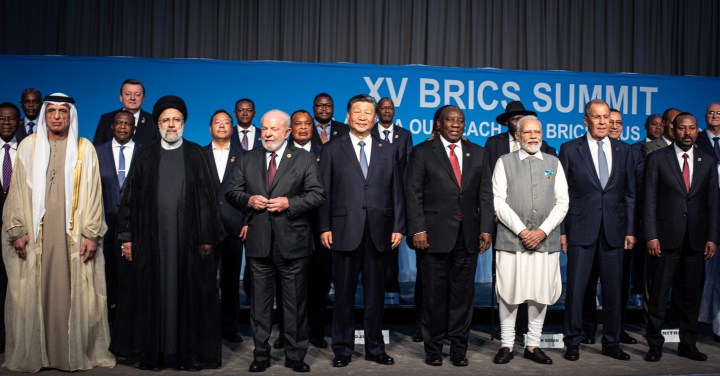INTERVIEW
G20 can be a more effective body than BRICS, says the bloc’s godfather Jim O’Neill

Adding six new members to the bloc is ‘economically almost meaningless’, asserts economist Jim O’Neill.
Making the globally representative G20 a more effective body is much more important than expanding the BRICS bloc, as happened last week, says economist Jim O’Neill, the man who invented the BRIC concept.
O’Neill told Daily Maverick in an interview that the six new countries admitted to BRICS at its 15th summit in Johannesburg — Ethiopia, Egypt, Saudi Arabia, United Arab Emirates, Iran and Argentina — had not “dramatically boosted” the total economic clout of the bloc.
They had made BRICS more powerful symbolically — as a champion of the Global South — but, other than Saudi Arabia, the expansion was “economically almost meaningless compared to what the BRICS is on its own”.
O’Neill said the BRICS had not revealed the criteria for expansion, but it did not seem that economic size had been one of them.
Indonesia had been left out despite its large economy and its success in navigating internal and global challenges, arguably better than any other major commodity producer.
O’Neill was also perplexed that Nigeria had not been admitted, as its economy was the largest in Africa.
Both these countries were on a list of 23 South Africa said had formally applied to join, but there have been indications since that they may not have done so.
O’Neill conjectured that Indonesian President Joko Widodo might have decided it was better not to join BRICS “because he likes being courted by the West”.
Adding countries like Indonesia and Nigeria, along with Mexico and Turkey, would have been “certainly a lot more economically significant”.
BRICS officials have nevertheless boasted that the BRICS Plus or BRICS11, as some now call it, has a larger combined GDP in purchasing power parity (PPP) terms — though not in nominal terms — than the G7 group of industrialised nations.
G20’s ‘credible influence’
But regarding the BRICS and now the BRICS11 as a competitor to the G7 was a “mistaken pursuit”, O’Neill said, because “neither the G7 nor the BRICS Plus are, in the slightest bit, sensible entities to represent the interests of the world, whereas the G20 has some pretty credible, legitimate influence.”
Unfortunately, though, since the disruptive influences of former US president Donald Trump and the recently more assertive global stance of Chinese President Xi Jinping, the G20 was struggling to function. “But it is definitely, in my opinion, much more legitimate than either the G7 or BRICS Plus.”
O’Neill cited an article that he had published this week in the Chinese financial journal Caixin Media, which noted that, according to the IMF, the aggregate GDP of the G7 countries in nominal US dollars in 2023 was about $45.9-trillion, some 43-44% of global GDP. In PPP terms; the G7 is about 29% of global GDP.

Jim O’Neill, former chairman of Goldman Sachs Asset Management, pauses during the London Conference at Lancaster House in London, U.K., on Tuesday, June 3, 2014.Photographer: Simon Dawson/Bloomberg via Getty Images
At less than 50% of global GDP in either current or PPP terms, the G7 “is hardly a group to solve issues that affect more than half the rest of the world’s GDP”.
But neither was the BRICS Plus, O’Neill said. Its collective 2023 nominal GDP was about $28-trillion, just above 25% of global GDP. In PPP terms, its combined GDP was bigger, accounting for about 38% of global GDP, which was notably bigger than the G7’s.
G20 countries combined produced close to 80% of global GDP because they included the G7, the original BRICS and other important economies such as Indonesia, Mexico, Turkey, Saudi Arabia and South Korea.
The US has not really reacted to the expansion of BRICS and O’Neill thought this might be because it was currently trying to mend relations with China.
He thought the expansion might get the US thinking again “about how they go about trying to resurrect the G20 as some kind of fruitful policy-making forum.
“Because what this BRICS Plus expansion does highlight … is that a lot of these guys still think they don’t have a voice.
“And so, I think they need to find, we need to somehow find, a better way to make … these countries feel legitimately represented in something like the G20.”
On the other side, though, O’Neill said he thought China needed to adopt “a more nuanced and more sophisticated” way of engaging internationally.
G20 resurrection
“Whatever now happens as a result of the expansion, I would like to see a much-needed resurrection of the G20, so that truly global challenges of our time — economic frailties and inequality, climate change, infectious diseases and much more — can have a better chance of being given the pertinent attention,” he wrote in the article.
Ironically, shortly after this interview took place, the upcoming G20 meeting due to take place in Delhi on September 9-10 suffered a major setback when Xi announced he would not attend.
O’Neill noted that Brazilian President Lula da Silva had called for a BRICS currency, but commented that any suggestion the group could create something like the euro was “quite mad”.
But he did say the Chinese, in particular, were exploring the growth of the renminbi, albeit in a very careful and methodical way.
What was influencing the Chinese was the 1989 Asian crisis and the prevailing view was that many Asian countries were shown to have made an error by allowing their currency markets to be more open when the domestic financial market was not.
So the Chinese are exploring whether they could conduct a lot more trade in the renminbi without having to lose control over the capital account and therefore indirectly their own monetary policy.
This was obviously sensible and it made sense to think about the balance of the global monetary system.
Although it would be very hard to implement, one possibility was to enlarge the role of the IMF’s Special Drawing Rights, with the yuan and the euro being a much more critical part of it, along with the dollar.
“But you can’t do that until the yuan is allowed to be used a lot more,” O’Neil said. DM















 Become an Insider
Become an Insider
Interesting all the to and fro on the subject of BRICS. I would be interested to read a relevant critique about the potential impact of institutional corruption and the potential colonisation of countries resources.
Spot on – more info needed on what is driving these countries to form this type of coalition if they do not really have reciprocal economic clout! It really does appear that Russia and China are merely expanding the “colonial” ambitions to rob the resources of Southern Africa and possibly Brazil and the UAE and Middle East hedging their bets for access to other resources other than Oil! Unity is about a common objective – there is no common goal with BRICS, at least none that has been explained which makes one wonder! The relationships are more about imbalanced reciprocity – we will lend you money against robbing your resources….not a fair trade in my opinion!
Playing on ANC naïveté and willingness to give away the National treasure for a bottle of Moët.
Its a shame that our pen wielding cold war warriors have to ignore logic when confronting the challenge of Brics+. Most of the Brics countries are already members of the G20. This has not saved them from sanctions and other tools in Nato’s unilateral weaponisation of these structures. Thats why they have to create an alternative. Why should the US and UK unilaterally be able to sanction you outside of international law? Nato has used its power to turn international bodies into a pigsty. When you are a fighting a pig, get out of the mud.
I think the article underestimates the GDP size of the G7 block. According to me only the USA is already about 24% of world GDP, the UK 6% (6th largest economy in the world) and both Germany (4th largest) and France (5th largest) are even bigger. Then we are not even considering Japan, which is the 3rd largest and probably close to 10%. That makes the G7 represent more than 50% of world GDP.
According to ChatGPT, 50% is to high. USA is 20%, UK 2-3%, Germany 4 to 5%, France 3 to
4% and Japan 6 to 7%. Totalling approximately 37%